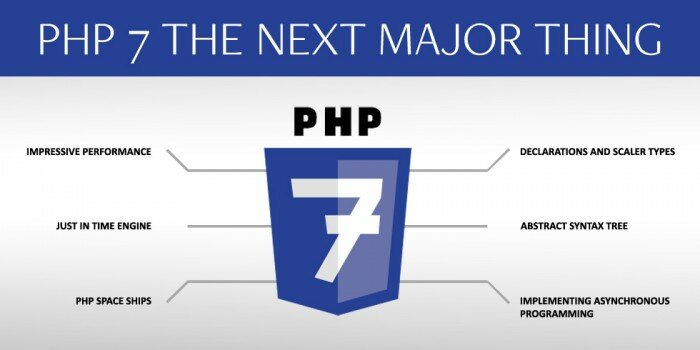Several facts about PHP7. Is it true that you are a web designer or a site proprietor? Do your locales keep running on PHP-empowered CMS, for example, WordPress, Magento, Drupal, or Joomla? At that point we have uplifting news: the component complete beta of this all new PHP 7 was as of late discharged. The 7.0.0 noteworthy discharge contains such a variety of cool components that we chose to commit an entire post to it. Be that as it may, initially, we have to slide in a couple of updates.
Keep in mind: PHP 7 is still in its advancement stage so don’t utilize it in production. In the event that – if you’re a future client – you need to take what’s coming to you from the improvement process, you might help with getting the most recent beta, play around with it during your testing surroundings and report any bugs you find amid the testing.
Now, with that off the beaten path, how about we look at PHP 7?
1. It’s PHP 7 (Don’t Call It PHP 6)
The present stable discharge utilizes the rendition PHP 5.6. Despite some disputes, the improvement group chose they would discard the name PHP 6 for the following significant discharge. PHP 6 as of now occurred during the past as a test extend however never came to the generation stage.
To keep clients from stirring up the previous endeavor with the most recent improvement, the new significant discharge will keep running under the PHP 7 name.
2. The All New Zend Engine
The Zend engine has been driving PHP ever since 1999 at the time when it got presented with the PHP 4 discharge. Zend is an open-source engine written in the C language that deciphers the PHP dialect. The existing PHP 5.X arrangement uses the Zend Engine II which improved the functionality of the starting engine and includes an extensible article model and a critical execution upgrade to the dialect.
3. Encourages Error Handling
Most definitely, taking care of lethal and catchable deadly mistakes have never been a simple errand for PHP coders. The new Engine Exceptions will permit you to supplant these sort of mistakes with special cases. In the event that the special case is not got, PHP will keep on giving back the same deadly mistakes as it does in the current 5.X arrangement.
4. Support for 64-Bit Windows Systems
PHP is an unmistakable individual from the LAMP stack that implies its local surroundings is Linux – however, on the other hand it’s conceivable to make it work on a Windows framework. The 5.X arrangement don’t yet give 64-bit whole number or substantial record bolster, so as of recently x64 manufactures have been viewed as trial.
PHP 7 is going to change that as it presents steady 64-bit support that implies both local 64-bit numbers and substantial records will be upheld, permitting you to unhesitatingly run the dialect on a 64-bit Windows framework later on.
5. Double The Speed
PHP has always been popular among the web developers with all its features, adding to this in PHP 7 is its all new new Zend engine. What’s the most effortlessly conspicuous point of preference of the new PHPNG engine? It is the noteworthy execution change. The improvement group of PHPNG recreated the Zend Engine, and surprisingly enhanced memory utilization.
6. Empowers Accurate Type Declarations
Did you ever needed to forestall unintentional return values by announcing the arrival kind of a capacity? All things considered, the latest PHP 7 empowers designers to upgrade the nature of the code along with the assistance of return sort announcements.
To upgrade the component considerably more, the PHP 7 presents 4 new sort assertions for scalar sorts: int, bool, float, and string. The all new scalar sorts permit designers to signify they are expecting whole numbers, strings, Booleans, or floats to be returned. The all new scalar sorts presented by PHP 7 will likewise be upheld by contention Type Hints which empowers engineers to compel the kind of parameters ever since the PHP 5.X arrangement.
7. Includes Anonymous Classes
The PHP 7 empowers you to utilize unknown classes, as of now a settled practice in other article arranged dialects like Java and C#. An anonymous class is referred to as a class that has no name. The item this instantiates provides the same usefulness as an object of a named class.
The sentence structure is the same as in customary PHP classes, just the name is absent. In the event that mysterious classes are utilized well, they can accelerate coding also execution time. Unknown classes are phenomenal when a class is utilized just once amid execution and in situations when a class doesn’t should be reported.
8. Encourages Imports From the Very Same Namespace
The all new Group Use Declarations highlight will be significantly help to people who need to import numerous classes from the very same namespace. What’s more, the new version of this syntax helps cut verbosity, assists with making your code cleaner and simpler in terms of readability, and spares you a ton of writing time.
This will likewise be simpler to peruse through and investigate codes, as gathering use affirmations offer you some assistance with identifying the imports which have a place with the exact same module.
9. Tidies Up The Room
The objective of PHP 7 was to help with freeing up enough space to empower change, and as such it was important to dispose of numerous belittled functionalities as well as unsupported and old Server APIs and expansions.
All the evacuated things have been belittled for some time in PHP 5 and as such, no doubt you haven’t utilized them for quite a while. Nonetheless, please note in the event that you have a legacy application running on more established PHP forms the new version of PHP 7 will potentially help you break the code.








